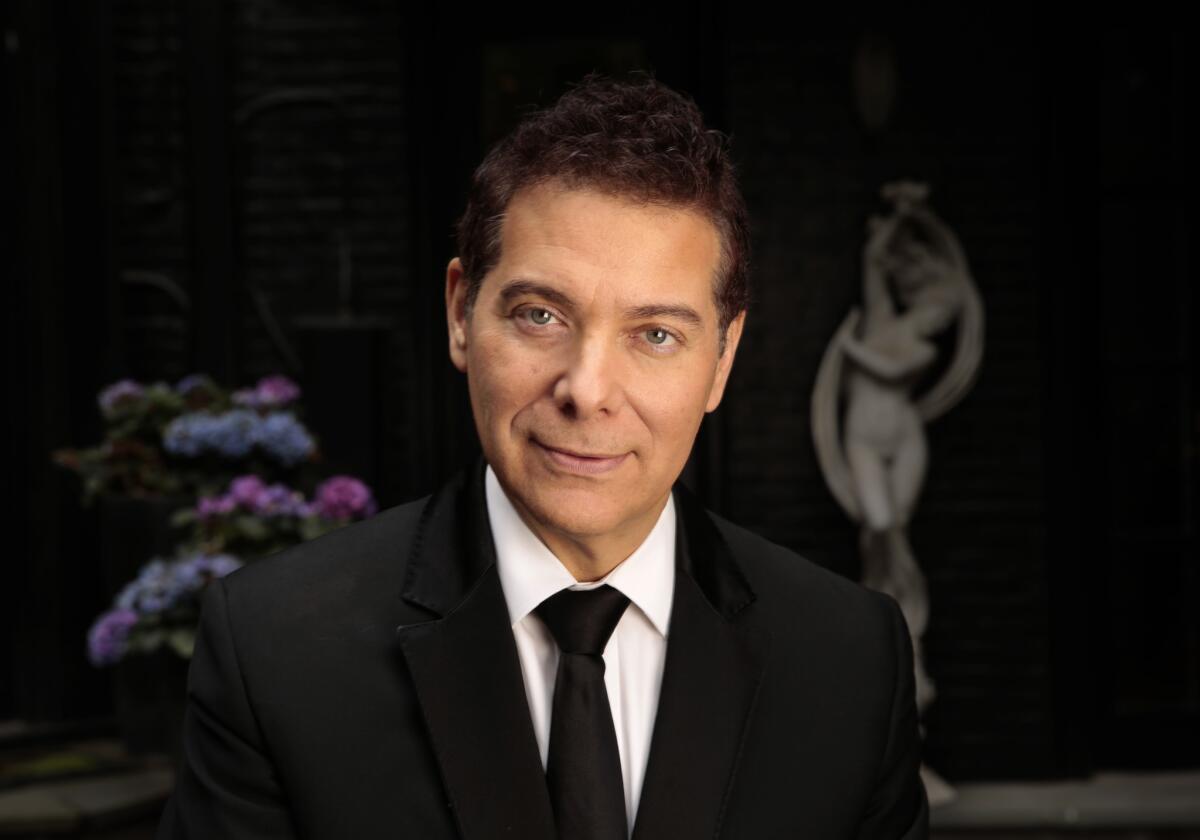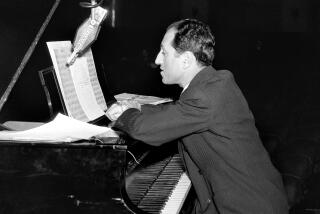Michael Feinstein is keeping the standards alive

Perhaps the most concise way to summarize Michael Feinstein’s work over nearly 30 years as a prominent keeper of the flame for the Great American Songbook is to say that the Great American song title that least applies to him might be Duke Ellington and Bob Russell’s “Don’t Get Around Much Anymore.”
Feinstein, 57, came to L.A. from his native Ohio in the 1970s to sing and play in piano bars, immersed himself in the art and lore of his musical calling as an assistant to Ira Gershwin, and has gone on to champion his favored song form in all venues at hand including co-proprietorship of Feinstein’s concert nightclub and a nonprofit foundation based outside Indianapolis. He’s also branched into composing for musicals, and he hopes his first attempt, “The Gold Room,” based on the life of heiress Barbara Hutton, will land a production in England, where his collaborator, lyricist-librettist Warner Brown, is based. Last summer, Feinstein leaped into conducting an orchestra for the first time, as principal conductor of the Pasadena Pops. His first season drew big crowds, and the second begins with a concert titled “Feinstein’s Favorites” on June 7 at the Los Angeles County Arboretum in Arcadia.
What have you been doing to sharpen your conducting skills?
It’s just been an immersion process, where every day I do some work, if it’s studying a score or flailing my arms while standing in front of a mirror, whatever it takes. I’ve always made music without formal musical education, and some people might say, “Well, that’s evident.” But this requires a great musical knowledge and skill that I’m gaining in small increments. The exciting part is connecting the dots, learning how to physically conduct something and make it sound as I feel it in my body.
Did you get along with the Arboretum’s flock of peacocks, which are known to be quite vocal during Pops concerts?
Yes, they are vocal. One night I was onstage and they started their caterwauling. Sometimes, the cadence of their cry sounds like they’re saying, “Schmuck! Schmuck!” The only rejoinder was, “Well, everyone’s a critic.” But being an animal lover and a vegan, I don’t mind them at all. I love that they’re there.
You must have had to put up with human hecklers early on when you were playing in piano bars.
Playing in piano bars five hours a night was the greatest training I could have had, for many things. Years ago, I was playing in a club on New Year’s Eve, and among the attendees was Joan Fontaine, the Academy Award-winning actress. She was practically in the show, seated down front, and she was gloriously dressed and she was gesticulating to the audience and having a great time enjoying her Champagne until she became inebriated. She started saying things like “You’re terrible! Get off the stage!” — and started yelling. Suddenly, it went from the joy of seeing Joan Fontaine sitting there to the horror of thinking, “Joan Fontaine? Yelling at me?” That was quite an experience.
Has keeping the standards alive been helped by shows such as “American Idol” and “Glee” and albums of standards by pop stars?
I may not always like the interpretation, but the exposure is great, and in that way it’s always wonderful. It seems anyone with a waning career will record standards and try to revitalize it. Rod Stewart certainly has had tremendous success, and while I find those interpretations bloodless, at best, whether I like them or not is inconsequential. Because clearly there are many people who love those recordings, and hopefully, it will lead them to the more sublime and more lasting interpretations.
Do you think any singers coming from rock and contemporary pop have done standards well?
I thought Linda Ronstadt was so canny to work with Nelson Riddle. She wanted to do something authentic, and she had the sensibility of going to the greatest arranger of American popular music. I think k.d. lang has a natural affinity for singing standards. I was delighted a couple of years ago to watch Lady Gaga sing “Someone to Watch Over Me” on the “Today” show. She just accompanied herself at the piano, and the simplicity of it was absolutely beautiful.
Now that you’re composing for musicals, are you sensitive to the common complaint that contemporary Broadway shows seldom, if ever, send the audience home humming the songs?
Melody is the key to creating something that is lasting. The problem for me with a lot of contemporary Broadway is that the songs are not particularly well-crafted, in that they do not further the plot. They’re often brilliantly staged, but the songs themselves are not very well done. A classic show like “Gypsy” or “My Fair Lady” or “Guys and Dolls,” when a character sings something, it creates a moment that transports the audience emotionally to another place. As much as I adore Elton John as a great pop writer, I don’t think that “Billy Elliot” has a very good score, because it doesn’t accomplish the essential thing that is required in a musical. To me, that is the greatest problem with Broadway, so I’d like to take a crack at it.
“The Gershwins’ Porgy and Bess” became controversial when Stephen Sondheim sent a letter to the New York Times, objecting that the new revival’s title slighted DuBose Heyward, who created the story and co-wrote the lyrics with Ira Gershwin. Sondheim wrote that “most of the lyrics (all of the good ones) are his alone” — meaning Heyward’s.
Ira was an equal contributor to the lyrics. Stephen Sondheim has a particular hate for Ira’s lyrics, referring to them in his book as “rhyming poison.” So I don’t feel that Sondheim, brilliant and wonderful as he is, has a very objective perspective about Ira’s work. Ira was somehow aware that Sondheim didn’t respect him, and that hurt him greatly. Yet, in the Gershwin archive, there’s a very complimentary letter that Sondheim wrote to him, so that’s kind of an odd situation.
How far along are you with the museum in Indiana?
The organization, which we now call the Great American Songbook Foundation, has a marvelous archive that’s ever-growing, with a world-class collection of sheet music. We are in Carmel, Ind., because we were approached by the city. At first I thought, “Why would I want to go to Carmel, Ind.?” Then I saw the facility and the promise of support that has indeed materialized. The museum is still in the formative stages, but the great thing is that I know it will happen. Kids from 30 states compete in the annual singing competition, and in the next three years, we’ll be in all 50 states. I call it the “Anti-American Idol.” Not all kids listen to pop music, and not all kids are interested only in hearing histrionics and a big high note at the end. There are many thousands of kids out there who have a different sensibility and experience with music, and we’ve had the experience of discovering these young talents and nurturing them, and it’s the most thrilling part of what the organization accomplishes.
More to Read
The biggest entertainment stories
Get our big stories about Hollywood, film, television, music, arts, culture and more right in your inbox as soon as they publish.
You may occasionally receive promotional content from the Los Angeles Times.







